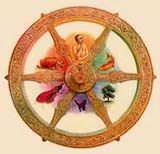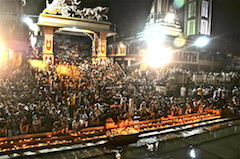What do Hindus believe?
Vital statistics
Hinduism is the oldest religion in India, evolved over a period of 5,000 years and practiced by 80% of the country’s population of more than a billion people.
In India there are countless sacred Hindu sites and shrines, and every year more than 80 million Hindus make a pilgrimage to the religion’s six most important sites.
This impressive figure does not include the Kumbh Mela which only happens once every twelve years and was last attended by over 100 million people in January 2013 - the largest human gathering in history.
Hinduism and Nature
Hindus believe in the continuity of existence, with the same soul passing through many different lifeforms as it is reincarnated over and over again. This means that it is a religion that puts great value on all living things and respects the need to care for the environment. To express their fath Hindus worldwide are often involved in environmental action. This is especially important in the care of the Ganges (or Ganga) River which Hindus consider most sacred yet is sadly seriously polluted.
Principal elements of Hindu belief
 |
 |
 |
The wheel of rebirth, called Samsara, carries the soul through many species on its journey to human life |
The principal ideas underpinning Hinduism are:
The eternal soul, or What is the Purpose of Life?
Hindus believe in an eternal spiritual truth, called Brahman, from whom all existence comes. The purpose of life is to understand this truth and to understand one’s eternal identity as the atma, or soul. The soul passes through many kinds of life, but only human life offers the chance of learning this truth. Therefore Hindus believe it is important to use the opportunity of a human birth to understand oneself and God.
return to the top of the page
Reincarnation, or What happens after we die?
Reincarnation is the belief that the soul lives for many lifetimes, in one body after another. The soul is sometimes born in a human body, sometimes in an animal body and sometimes in a plant body, such as that of a tree. Therefore all forms of life contain a soul, and all souls have the chance to experience life in different forms. The cycle of rebirth is called samsara, and under the influence of karma, the soul moves upwards and downwards on the wheel of rebirth. Hinduism teaches that the ultimate solution to life's basic problems is to be released from karma and gain freedom from this cycle of rebirth.
return to the top of the page
 |
 |
 |
Thousands of Hindus attend the evening ceremony on the banks of the Ganges at Rishikesh. |
Karma, or Why does Stuff Happen to us?
Karma is the Sanskrit word for action. Actions are important because they bring reactions. Hindus believe every experience, pleasant or unpleasant, is linked to past actions, in this lifetime or in some previous lifetime. This does not rule out free choice, because by practicing yoga, or spiritual discipline, one can change one’s actions and so change one’s future. Belief in karma teaches people to accept responsibility for their behaviour, and learn from their mistakes.
return to the top of the page
Cool links
The Hidden Forest is a play script and story for schools. It's funny, it's smart, it's got loads of roles for girls. And it tells the story of how three generations go on pilgrimage to Braj (not everyone is as keen as everyone else) and they each in their own way find a solution to their own problem, while also seeing how they could help pilgrimage be more positive to the landscape.
|

